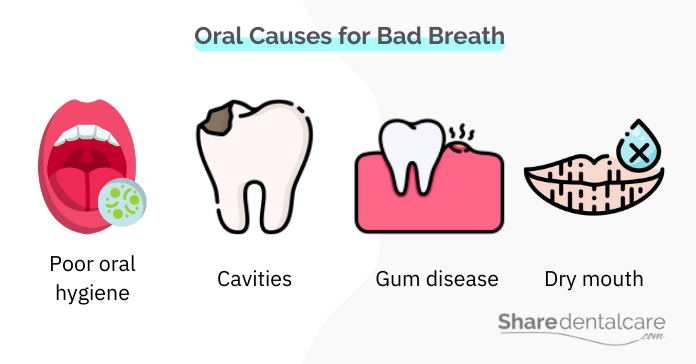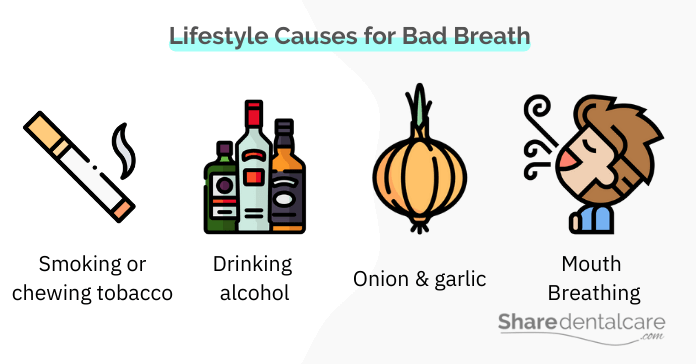Good oral hygiene is good for your health and well-being. But what if you maintain good oral hygiene by brushing, flossing, and rinsing your mouth yet still have bad breath? It can be frustrating because you feel like there’s no cure for this. We’ll cover the possible causes of bad breath and how you can get rid of it.
What is Bad Breath?
Bad breath, also known as halitosis, is an embarrassing condition that causes a foul smell from the mouth. Bad breath can affect your professional and personal life by making you not want to talk to people or have them be near you. It can also cause bad impressions of yourself in the eyes of others. Bad breath is usually caused by poor oral hygiene. However, many people still have bad breath despite maintaining good oral hygiene, which can indicate a more serious condition. Possible causes of halitosis with good oral hygiene can range from oral problems such as diseases of teeth & gums to medical conditions such as diabetes.
Possible Causes: Do You Still Have Bad Breath Despite Good Oral Hygiene?
If maintaining good oral hygiene isn’t enough, and you still have bad breath, it could be the time to ask yourself what the underlying causes are. There are many possible causes for bad breath, which can range from gum disease to diabetes. We will categorize the causes into oral, systemic, and lifestyle.
Oral Causes
- Not brushing or flossing properly: If you don’t brush your back teeth or floss between teeth properly, this can cause food particles and bacteria to stay, causing bad breath. Learn more about the effects of poor oral hygiene with braces on your oral health.
- Not cleaning your tongue: tongue can harbor bad breath bacteria. If you don’t clean your tongue regularly, this may explain why you still have bad breath. Read more about poor oral hygiene & white tongue.
- Cavities: although good oral hygiene reduces the risk of cavities, it can’t eliminate them. If you have not seen a dentist in over 6 months or a year, then you may have an undiagnosed cavity that harbors bad breath bacteria.
- Gum disease: periodontal pockets are one of the signs of gum disease, which are difficult to clean by brushing or flossing. If you have good oral hygiene and still have bad breath, then you may have gum disease.
- Dry mouth: saliva is good for breaking down bacteria; therefore, if you have a dry mouth or don’t drink enough water, it can cause bad breath. Dry mouth can also be caused by medications and some medical conditions.
- Tartar (calculus): It’s a buildup of hardened plaque that can stick to your teeth and trap bacteria in them. Tartar can’t be removed by brushing. So, you should visit your dentist for professional cleaning.
- Dental prostheses & appliances: If you wear dental prostheses or appliances such as braces, dentures, or retainers which are good for your oral health, but they also trap food and bacteria in the mouth. So, you need to clean them regularly.

Lifestyle Causes
- Smoking or chewing tobacco: they dry your mouth and increase the risk of gum disease and poor general oral health. If you are a smoker, you will still have bad breath despite good oral hygiene. Learn more about the negative effects of tobacco on smokers teeth and gums.
- Drinking alcohol: can dry out your mouth and tongue, which can cause bad breath.
- Some foods: such as onion, garlic, and spices. Oils from these foods can get into your bloodstream and then be carried into your lung, causing unpleasant breath
- Unbalanced diet: If you don’t have a good diet, you can still have halitosis and/or gum disease despite good oral hygiene
- Dehydration: not drinking enough water can cause a dry mouth, which can affect your breath.
- Mouth breathing: some people have a habit of breathing through their mouth instead of their nose even after the nasal obstruction clears.

Systemic Causes
- Hormonal imbalance: some women may have good oral hygiene but still have bad breath because of hormonal imbalances during the menstrual cycle, during or after menopause, and pregnancy. Learn more about pregnancy gingivitis.
- Gastroesophageal reflux disease: GERD can cause backflow of stomach acids into your mouth and throat, causing an unpleasant odor.
- Chronic diseases: such as diabetes, kidney failure, liver failure, GERD, lung infections, and cancers
- Medications: There are certain medications such as NSAIDs that have been known to worsen breath.
How To Get Rid of Bad Breath If Good Oral Hygiene Still Doesn’t Work?
Are you maintaining good oral hygiene and still have bad breath? You can start by following these home remedies. Also, you should visit your dentist/doctor to identify the underlying cause and treat it. Persistent bad breath could be a symptom of a more serious disease, so you need to tell your doctor about it.
LifeStyle & Home remedies
- Use a toothbrush with a small head: to remove food debris from the back of your mouth. Brush gently in circular motions for about two minutes so that good oral hygiene can be achieved.
- Use dental floss: to remove food debris from between teeth.
- Use a tongue scraper: scrape the surface of your tongue until all the white stuff is gone.
- Drink plenty of water: Water will help to cleanse the mouth and increase saliva production. This prevents dryness in the mouth.
- Eat a balanced diet: Fiber, good fats, and protein are good for cleansing your mouth. They also help to improve the health of your gums and teeth
- Avoid smoking and alcohol drinking: they are not good for your general health. Learn more about how does smoking cause tooth decay and gum disease.
- Visit your dentist regularly: Visit your dentist at least once every six months for regular checkups and professional teeth cleaning. Also, to treat existing problems such as gum disease and cavities.
See Your Dentist If You Have Bad Breath & Good Oral Hygiene Still Doesn’t Work
If good oral hygiene is not enough to eliminate bad breath, and you still have it. it’s a good idea to visit your dentist. Your dentist can help you identify the underlying causes and treat them. If bad breath occurs due to systemic causes, your dentist will refer you to a doctor for treatment.
Good Oral Hygiene & Still Bad Breath – Conclusion
Bad breath, or halitosis, is a common problem that can be attributed to a variety of factors from poor oral hygiene to systemic disease. Good oral hygiene is the first step in reducing bad breath as proper dental care can help reduce bacteria levels. However, good oral hygiene is not enough to eliminate bad breath if there are other underlying causes such as hormonal imbalance, smoking, diabetes, or GERD. If good oral hygiene still does not work for you and you may have a systemic cause of bad breath, visit your dentist or doctor for treatment.